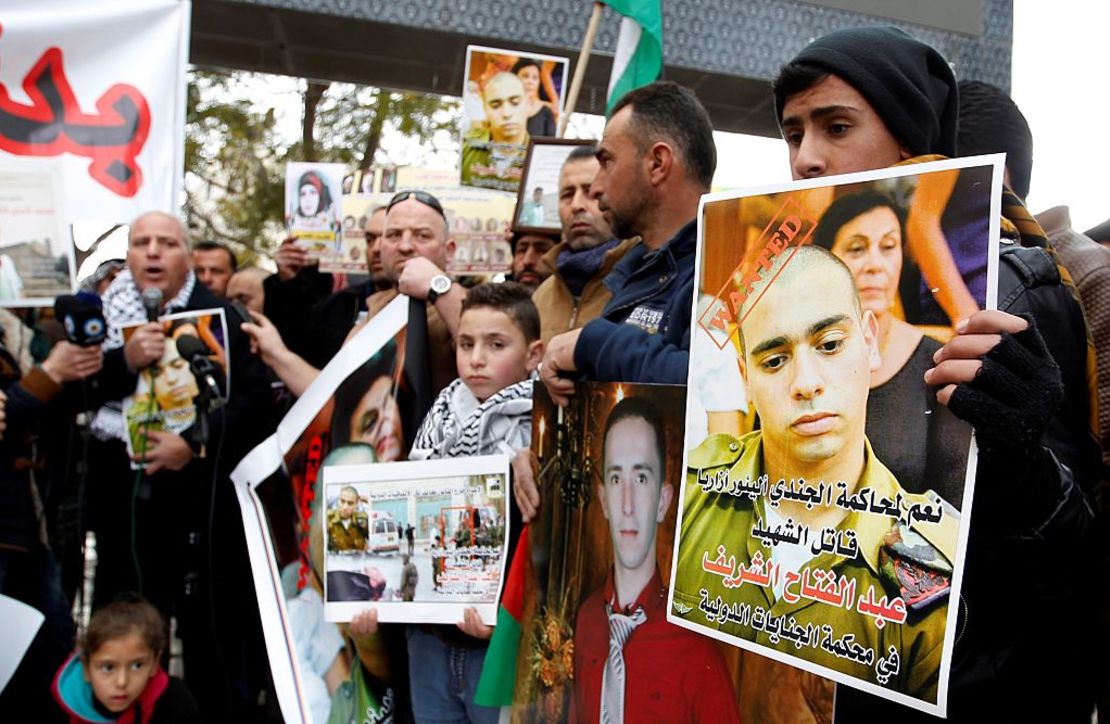Story highlights
Israeli soldier Elor Azaria faces up to 20 years in prison
There have been calls from mostly right leaning politicians to pardon him
Israeli Prime Minister Benjamin Netanyahu says he supports a pardon for Elor Azaria, an Israeli soldier convicted by a military court of manslaughter, in a case that is deeply dividing Israeli society.
Following Wednesday’s court ruling, Netanyahu said: “This is a difficult and painful day – first and foremost for Elor, his family, many citizens and parents of soldiers, me among them”.
Azaria faces up to 20 years in prison for shooting subdued Palestinian stabbing suspect last March last March. Azaria denied the charges against him.
Israel’s military chief of staff said that Azaria had violated the military’s code of conduct and was obliged to abide it.
But politicians – mostly right leaning – have argued that Azaria’s actions were justified and that he should never have faced prosecution for killing what they said was a terrorist.
Naftali Bennett, Israeli education minister and leader of the right-wing Jewish Home Party, called for an “immediate” pardon of Azaria.
“Today, a soldier who killed a terrorist, who tried to slaughter a soldier, was handcuffed and convicted as the last criminal, ” he said on his Facebook page.
Miri Regev, Israel’s minister of sports and culture, said she “will work to pardon” the convicted soldier. “This is not the way you behave with our soldier. This was a trial that should never have begun.”
The country’s president, Reuven Rivlin, has authority to issue pardons but has said he will wait for the legal process to run its course before making a decision.
Public opinion
Former Foreign Minister Tzipi Livni, a centre-left politician, said the verdict should be accepted. “Only that way can we stop the bleeding within Israeli society since the event occurred and reunite around the military and Israel as a state of laws, whose army is outside political discourse.”
CNN’s global affairs analyst Aaron David Miller said the case showed the divisions that exist in Israeli society, adding that Prime Minister Netanyahu had initially supported Israel’s military position “which is to raise serious questions about the actions of this particular soldier”.
“And then as public opinion began to move - and it clearly has moved given how many Israeli families have sons and daughters, brothers and husbands in the military,” he said. “The prime minister saw the political current and which way the stream was running.”
On Wednesday, several hundred supporters of the soldier gathered behind a police security barrier near the Ministry of Defense compound. “Our soldier, the hero,” they cried.
Some waved Israeli flags and held signs that read, “Today: Azaria Tomorrow: Your son.”
As the trial was underway, Palestinians in Hebron, in the West Bank, held posters calling for punishing Azaria.

At the heart of the case was the motivation for the soldier’s actions.
Azaria’s defense argued he felt his life was in danger, while the prosecution contended he was acting out of revenge and pulled the trigger when there was no threat.
In a lengthy explanation before the verdict was delivered, the judges rejected all the defense arguments.
Video evidence
The head judge, Col. Maya Heller, said that Azaria was an “unreliable” witness and that his defense witnesses were also problematic. She called the shooting “needless.”
Charges were brought against Azaria after footage emerged last March showing the soldier shooting a Palestinian man in the head as he laid on the ground, injured and already subdued.
The Palestinian, Abdel Fattah al-Sharif, 21, was one of two men accused of stabbing another Israeli soldier in Hebron a few minutes earlier. The second Palestinian suspect had already been shot dead.
Azaria was serving in the mostly Palestinian-populated Hebron when he shot Sharif. The Israeli soldier who had been attacked suffered a minor injury.
The video, a critical piece of evidence, was shot by Palestinian activist Imad Abu Shamsiyeh, who lives in Tel Rumeida next to the site of the shooting.
Abu Shamsiyeh told CNN Thursday that he been receiving death threats and that the threats have increased since Wednesday’s verdict.
“I have been receiving threats to my life since the moment the video was released, but yesterday the amounts of threats increased. I fear for my life and my family’s life,” Abu Shamsiyeh said, adding that he received threatening pictures to his phone and Facebook account.

